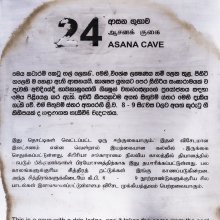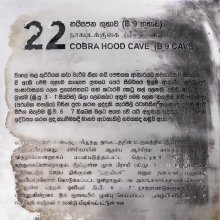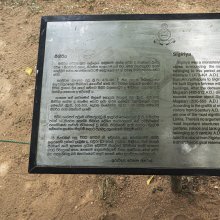Katara, Kātara, Kaṭara, Kātāra: 20 definitions
Introduction:
Katara means something in Hinduism, Sanskrit, Buddhism, Pali, Marathi, Hindi, Tamil. If you want to know the exact meaning, history, etymology or English translation of this term then check out the descriptions on this page. Add your comment or reference to a book if you want to contribute to this summary article.
Alternative spellings of this word include Katar.
Images (photo gallery)
In Hinduism
Pancaratra (worship of Nārāyaṇa)
Source: eScholarship: Chapters 1-14 of the Hayasirsa PancaratraKātara (कातर) refers to “one who is timid”, representing an undesirable characteristic of an Ācārya, according to the 9th-century Hayaśīrṣa-pañcarātra Ādikāṇḍa chapter 3.—The Lord said:—“I will tell you about the Sthāpakas endowed with perverse qualities. He should not construct a temple with those who are avoided in this Tantra. [...] He should not despise Tantra or be devoted to plotting against others. He should not be born of adultery nor have the voice of a crow, be impotent, timid (kātara) or irascible. [...] A god enshrined by any of these named above (viz., kātara), is in no manner a giver of fruit. If a building for Viṣṇu is made anywhere by these excluded types (viz., kātara) then that temple will not give rise to enjoyment and liberation and will yield no reward, of this there is no doubt”.

Pancaratra (पाञ्चरात्र, pāñcarātra) represents a tradition of Hinduism where Narayana is revered and worshipped. Closeley related to Vaishnavism, the Pancaratra literature includes various Agamas and tantras incorporating many Vaishnava philosophies.
Purana and Itihasa (epic history)
Source: Wisdom Library: Skanda-puranaKātara (कातर) refers to the “distress (caused by the separation from one’s husband)”, according to the Skandapurāṇa 5.1.53b (“Piśācamocana Tīrtha”).—Accordingly, as Sanatkumāra narrated to Vyāsa: “[...] There was a great Brāhmaṇa who had mastered the Vedas and Vedāṅgas. He was self-controlled and he regularly performed sacrifices with the holy fire. [...] His wife was very beautiful with excellent features. She was chaste and of noble qualities. She used to smile pleasantly. She was of firm mental resolve. When her husband was killed, she became miserable. She was badly distressed due to the separation from her husband [i.e., kātara—pativirahakātarā]. She was left in the lurch in the terrible forest. The beautiful woman gathered fuel and twigs together and kindled the funeral pyre which she ascended along with her husband. She was mentally pleased in doing so. [...]”.
Source: archive.org: Shiva Purana - English TranslationKātara (कातर) refers to the “excitement (caused by the separation from one’s beloved)”, according to the Śivapurāṇa 2.3.10.—Accordingly, as Brahmā narrated to Nārada:—“O celestial sage, most excellent among the devotees of Śiva, listen to His glory that sanctifies, renders everything auspicious and increases devotion. Returning to His mountain, Śiva in his excitement caused by his separation from his beloved [i.e., priyāviraha-kātara], remembered Satī, who was dearer to Him than his very life. Addressing His Gaṇas, He bewailed her and narrated her good qualities heightening love. In this way He showed the way of the world to the people. [...]”.

The Purana (पुराण, purāṇas) refers to Sanskrit literature preserving ancient India’s vast cultural history, including historical legends, religious ceremonies, various arts and sciences. The eighteen mahapuranas total over 400,000 shlokas (metrical couplets) and date to at least several centuries BCE.
Languages of India and abroad
Pali-English dictionary
Source: BuddhaSasana: Concise Pali-English Dictionarykatara : (adj.) which (of the two). || kātara (adj.), mean; poor; miserable.
Source: Sutta: The Pali Text Society's Pali-English DictionaryKatara, (adj.) (Vedic katara, interr. pron. with formation of num. ord. , cp. Gr. pόteros, Lat. uter) which one (of a certain number, usually of two) J. I, 4; PvA. 119. Often only emphatic for ko, e.g. J. I, 298 (kataraṃ upaddavaṃ na kareyya), and used uninflected in cpds. , as katara-geha J. III, 9; °gandhaṃ J. VI, 336; °divasaṃ J. II, 251; °nagarato (from what city) DhA. I, 390; °nāma (kataraṃnāma, adj.) (of what name) ibid.—katarasmiṃ magge in which way, how? J. IV, 110. (Page 182)

Pali is the language of the Tipiṭaka, which is the sacred canon of Theravāda Buddhism and contains much of the Buddha’s speech. Closeley related to Sanskrit, both languages are used interchangeably between religions.
Marathi-English dictionary
Source: DDSA: The Molesworth Marathi and English Dictionarykaṭāra (कटार).—f ( H) A sort of dagger or poniard. 2 A dagger-form stripe on cloth. 3 fig. Any piercing or severe affliction or trouble. ka0 jivālā asaṇēṃ or lāgaṇēṃ g. of s. To suffer poignant sorrow or great anxiety. ka0 ṭāṅgaṇēṃ jivāvara g. of s. To have a dagger (as of debt, imperative duty, menaced evil) hanging over one; to be in the position of Damocles. ka0 lāvaṇēṃ To reproach, probe, taunt.
--- OR ---
kaṭārā (कटारा).—m (Commonly kaṭhaḍā) A railing or paling; banisters &c.
--- OR ---
katāra (कतार).—f katārā m ( A) A row, rank, line, or string (esp. of camels). 2 A line or chain (of hills).
--- OR ---
kāṭārā (काटारा).—m (Properly ūṇṭakaṭārā) Globe thistle.
--- OR ---
kātara (कातर).—f A disease of the hair and wool of living creatures. v lāga. Called also kātarī, caī or cāī, undarī
--- OR ---
kātara (कातर).—a (S) Frightened: but pop. fearful, timorous, cowardly.
--- OR ---
kātara (कातर).—f (karttarī S) Large scissors or shears. 2 fig. The triangular space included between two rivers or roads meeting; between two radii of a circle; between two rafters joined transversely &c. &c.: applied likewise to the two rafters so joined, a couple. 3 Hence a state of difficulty and perplexity; a dilemma or strait. 5 The triangular space included between particular lines on the palm; or the lines so meeting as to form it. It is indicative of lucklessness, conjugal love &c. 6 The scissor-form member of an oilmill, embracing the ghāṇā and turning with it.
--- OR ---
kātarā (कातरा).—m (kātaraṇēṃ) Clippings or cuttings (of cloth, wood, paper, betelnut, leaves): also the portion to be cut off. 2 An indentation with scissors. v pāḍa, hō. 3 (Commonly pātharī q. v.) A wild pot-herb. 4 A slicing off of a bit: also the portion sliced off. v ghē. 5 fig. The diagonal descending from the ridge, where two portions of the roof of a building meet at a right angle;--as at the junction, perpendicularly to each other, of two sheds. 6 R A cleft or chap in the feet or hands. v paḍa. 7 A few layers or a stack of sheaves of śāḷū or jōndhaḷā In districts, as in parts of the North Dakhan, where śāḷū or jōndhaḷā is not grown, the word is identical with ḍhīga, gañjī, suḍī or stack gen. v ghāla.
--- OR ---
kātarā (कातरा).—ad decl Aslant, obliquely, askew.
Source: DDSA: The Aryabhusan school dictionary, Marathi-Englishkaṭāra (कटार).—f A sort of dagger. Fig. Any pierc- ing trouble or severe affliction. jivāvara kaṭāra ṭāṅgalēlī asaṇēṃ To have a dagger hanging over one. kaṭāra lāvaṇēṃ To tor- ment, to reproach or scold so as to cause the deepest pain.
--- OR ---
katāra (कतार).—f rā m A row. A line or chain (of hills.)
--- OR ---
kātara (कातर).—f Large scissors. Fig. A dilemma. a Timorous, frightened.
--- OR ---
kātarā (कातरा).—m Clippings or cuttings. An in- dentation with scissors.
Marathi is an Indo-European language having over 70 million native speakers people in (predominantly) Maharashtra India. Marathi, like many other Indo-Aryan languages, evolved from early forms of Prakrit, which itself is a subset of Sanskrit, one of the most ancient languages of the world.
Sanskrit dictionary
Source: DDSA: The practical Sanskrit-English dictionaryKaṭāra (कटार).—
1) A libidinous man, a lecher.
2) A citizen.
Derivable forms: kaṭāraḥ (कटारः).
--- OR ---
Kaṭara (कटर).—a. Despised.
-ram 1 The skim or whey of curds.
2) Buttermilk with water.
3) A sauce, condiment.
--- OR ---
Katara (कतर).—pron. a. (°rat n.) Who or who or which of two; नैतद्विद्मः कतरन्नो गरीयो यद्वा जयेम यदि वा नो जयेयुः (naitadvidmaḥ kataranno garīyo yadvā jayema yadi vā no jayeyuḥ) Bhagavadgītā (Bombay) 2.6. कतरः स आत्मा (kataraḥ sa ātmā) Ait. Up.5.1.
--- OR ---
Kātara (कातर).—a. [īṣattarati svakāryasiddhiṃ gacchati tṝ-ac koḥ kādeśaḥ Tv.]
1) Cowardly, timid, discouraged; वर्जयन्ति च कातरान् (varjayanti ca kātarān) Pañcatantra (Bombay) 4.42; Amaruśataka 8,34,77; R.11.78; Meghadūta 79.
2) Distressed, grieved, afraid; किमेवं कातरासि (kimevaṃ kātarāsi) Ś.4.
3) Agitated; perplexed, confused; उन्मत्तप्रेमसंरम्भादारभन्ते यदङ्गनाः । तत्र प्रत्यूहमाधातुं ब्रह्मापि खलु कातरः (unmattapremasaṃrambhādārabhante yadaṅganāḥ | tatra pratyūhamādhātuṃ brahmāpi khalu kātaraḥ) || Bhartṛhari 1.6.
4) Tremulous through fear (as eyes); R.2.52; Amaruśataka 79.
5) Eager; सन्तं वयसि कैशोरे भृत्यानुग्रहकातरम् (santaṃ vayasi kaiśore bhṛtyānugrahakātaram) Bhāgavata 3.28.17.
-raḥ 1 A large kind of fish.
2) A boat, raft.
Source: Cologne Digital Sanskrit Dictionaries: Edgerton Buddhist Hybrid Sanskrit DictionaryKatara (कतर).—pron. adj. (see also katira; compare anyatara; used in this way sometimes in Pali and apparently even in Sanskrit, where however the cases are rare and not always certain), which (of more than two)?: Divyāvadāna 102.17; 308.8; 371.23 kataraḥ (of several) kumāro…rājā bhaviṣyati; Śikṣāsamuccaya 75.4; Kāśyapa Parivarta 97.4 kataraṃ (cited Śikṣāsamuccaya 233.15 as katarat) cittaṃ; Mūla-Sarvāstivāda-Vinaya iii.136.10 (read kataraṃ tat), 12. In Lalitavistara 239.15 (Ārāḍasya dharmo…) na niryāti tat-katarasya samyagduḥkhakṣayāya, and Mahāvastu ii.119.5 (nāyaṃ) Ārāḍasya dharmo niryāti tat-katarasya (so mss.) samyagduḥkha- kṣayāye, could at best (but implausibly) be taken to mean A.'s religion does not result in the complete destruction of the misery of anyone. But Senart emended to tat-karasya, of (for) the one who performs it (sc. Ā.'s religion), which is confirmed by Tibetan on Lalitavistara de byed pa, one who has done that. It is indeed strange to find the same corruption in both texts; but the em. seems quite certain; it is con- firmed by Pali takkarassa Dīghanikāya (Pali) i.235.17; Majjhimanikāya (Pali) i.68.12, in a quite similar phrase; and in a close parallel Mahāvastu ii.120.16 one ms. reads tatkarasya (the other corruptly taktenasya).
Source: Cologne Digital Sanskrit Dictionaries: Shabda-Sagara Sanskrit-English DictionaryKaṭāra (कटार).—m.
(-raḥ) A libidinous man, a lecher.
--- OR ---
Katara (कतर).—mfn.
(-raḥ-rā-raṃ) Which, (of two,) whether. E. kim and ḍatarac aff.
--- OR ---
Kātara (कातर).—mfn.
(-raḥ-rā-raṃ) 1. Confused, perplexed, disordered. 2. Timid, gentle. m.
(-raḥ) A large kind of fish, commonly Katala (Cyprinus catla, Ham.) E. kā a little or badly, and tara what crosses.
Source: Cologne Digital Sanskrit Dictionaries: Benfey Sanskrit-English DictionaryKatara (कतर).—[ka + tara], compar. of kim, pron. n. ºrad, Who, what, which of two, Mahābhārata 1, 3645; of many, [Vikramorvaśī, (ed. Bollensen.)] 5, 14.
— Cf. [Latin] uter for cuter (ubi: alicubi), utrum; [Gothic.] hvathar; A. S. hvädher.
--- OR ---
Kātara (कातर).—i. e. katara + a (properly, irresolute), adj., f. rā, Timid, [Rāmāyaṇa] 4, 9, 103; disheartened, [Śākuntala, (ed. Böhtlingk.)] 56, 13.
Source: Cologne Digital Sanskrit Dictionaries: Cappeller Sanskrit-English DictionaryKatara (कतर).—([pronoun] [interrogative]) who or which (of two)?
--- OR ---
Kātara (कातर).—[adjective] cowardly, timid, shy, afraid of ([locative], [infinitive], or —°); [abstract] tā [feminine], tva [neuter]
Source: Cologne Digital Sanskrit Dictionaries: Monier-Williams Sanskrit-English Dictionary1) Kaṭāra (कटार):—[from kaṭ] m. a libidinous man, lecher, [cf. Lexicographers, esp. such as amarasiṃha, halāyudha, hemacandra, etc.]
2) Katara (कतर):—[from katama] mfn. (as, ā, at). (comparative of 2. ka; declined as a [pronominal], Gram. 236), who or which of two? whether of two? Analogously to katama above katara may occasionally be used to express ‘who or which of many?’ (e.g. katarasyāṃ diśi, in which quarter?), and may optionally be compounded with the word to which it refers (e.g. kataraḥ kaṭhaḥ or katara-kaṭhaḥ)
3) [v.s. ...] in negative sentences katara with cana = neither of the two (e.g. na kataraś-cana jigye), neither of the two was conquered, [Ṛg-veda etc.];
4) [v.s. ...] cf. [Zend] katāra; [Greek] πότερος, κότερος; [Gothic] hvathar; [English] whether; [Latin] uter; Old [German] huedar; [Slavonic or Slavonian] kotoryi.
5) Kātara (कातर):—mf(ā)n. ([etymology] doubtful, perhaps from katara, ‘uncertain as to which of the two’ [Boehtlingk & Roth’s Sanskrit-Woerterbuch]), cowardly, faint-hearted, timid, despairing, discouraged, disheartened, confused, agitated, perplexed, embarrassed, shrinking, frightened, afraid of ([locative case] or [infinitive mood] or in [compound]), [Rāmāyaṇa; Mṛcchakaṭikā; Raghuvaṃśa; Meghadūta; Śakuntalā; Pañcatantra; Hitopadeśa]
6) m. a kind of large fish (Cyprinus Catla, kātala), [cf. Lexicographers, esp. such as amarasiṃha, halāyudha, hemacandra, etc.]
7) Name of a man (See kātarāyaṇa)
8) n. (in sa-kātara) ‘timidity, despair, agitation.’
Source: Cologne Digital Sanskrit Dictionaries: Yates Sanskrit-English Dictionary1) Kaṭāra (कटार):—(raḥ) 1. m. A libidinous man.
2) Katara (कतर):—[(raḥ-rā-raṃ) a.] Which of two.
3) Kātara (कातर):—[(raḥ-rā-raṃ) a.] Confused, perplexed; timid. m. A fish.
Source: DDSA: Paia-sadda-mahannavo; a comprehensive Prakrit Hindi dictionary (S)Katara (कतर) in the Sanskrit language is related to the Prakrit words: Kayara, Kāyara, Kāyariya, Kāhala.
[Sanskrit to German]
Sanskrit, also spelled संस्कृतम् (saṃskṛtam), is an ancient language of India commonly seen as the grandmother of the Indo-European language family (even English!). Closely allied with Prakrit and Pali, Sanskrit is more exhaustive in both grammar and terms and has the most extensive collection of literature in the world, greatly surpassing its sister-languages Greek and Latin.
Hindi dictionary
Source: DDSA: A practical Hindi-English dictionary1) Kaṭarā (कटरा) [Also spelled katra]:—(nm) an enclosed yard (for residential purposes or turned into a market place); a buffalo calf.
2) Kaṭāra (कटार) [Also spelled katar]:—(nf) a dagger, poniard; ~[rī] a stiletto, small dagger.
3) Katarā (कतरा):—(nm) a drop; fragment; cutting.
4) Katāra (कतार) [Also spelled katar]:—(nf) a line, row; series; —[bāṃdhanā] to make / stand in a row.
...
Kannada-English dictionary
Source: Alar: Kannada-English corpusKaṭāra (ಕಟಾರ):—[noun] a large, round, metal (copper, brass, iron etc.) boiler.
--- OR ---
Kaṭāra (ಕಟಾರ):—[noun] = ಕಟಾರಿ [katari].
--- OR ---
Kāṭara (ಕಾಟರ):—[noun] a seat for a rider on a horse, usu. padded and of leather, and generally straddled in riding; a saddle.
--- OR ---
Kātara (ಕಾತರ):—
1) [adjective] (emotionally) disturbed; perturbed; agitated.
2) [adjective] put out of order; disordered.
3) [adjective] frightened; scared.
4) [adjective] eagerly wishing; anxious; ಕಾತರವಾಗು [kataravagu] kātaravāgu to become eaer; to be driven by zeal,enthusiasm.
--- OR ---
Kātara (ಕಾತರ):—
1) [noun] fearful uncertainty, anxiety, etc.; apprehension; trepidation.
2) [noun] keen desire; eagerness; ardent longing.
3) [noun] a man driven by desire, eagerness or impetuous impulsion.
4) [noun] a man who is scared or frightened.
5) [noun] (dance.) a moving of a foot or feet backwards without lifting off the ground; such a gait.
Kannada is a Dravidian language (as opposed to the Indo-European language family) mainly spoken in the southwestern region of India.
Tamil dictionary
Source: DDSA: University of Madras: Tamil LexiconKātāra (காதார) adverb < காது¹ [kathu¹] + ஆர்¹-. [ar¹-.]
1. With one’s own ears; தன்காதிற் பட. காதாரக் கேட் சாட்சி. [thankathir pada. katharag ked sadsi.]
2. To the full satisfaction of the ears; தன் செவிப்புலன் நிரம்ப. அவர் உபந்யாசத்தைக் காதா ரக் கேட்டுக் களித்தேன். [than sevippulan niramba. avar upanyasathaig katha rag kettug kalithen.]
Tamil is an ancient language of India from the Dravidian family spoken by roughly 250 million people mainly in southern India and Sri Lanka.
See also (Relevant definitions)
Starts with (+15): Kacaragama, Katarabeta, Katarabeti, Katarabheda, Katarabyomta, Kataragollu, Katarai, Kataraija, Kataraikutarai, Kataraka, Katarakantha, Katarakshi, Katarakutara, Kataram, Katarama, Kataramalla, Kataramparru, Kataran, Katarana, Kataranarattai.
Ends with (+20): Adhikatara, Akatara, Alakatara, Anekatara, Anugrahakatara, Anugrahanakatara, Atikatara, Bakatara, Bhayakatara, Bikh untkatara, Chinnakatara, Ekaikatara, Ekatara, Ghayakatara, Hayakatara, Ikatara, Kamakatara, Mahallakatara, Mangalalokatara, Navakatara.
Full-text (+59): Kadara, Kahala, Kayara, Kayariya, Katarata, Katarayana, Katarya, Anugrahakatara, Hayakanthara, Kataratas, Sakataram, Katala, Hayakatara, Khadiropama, Akatara, Katar, Kaira, Katura, Kadar, Kataram.
Relevant text
Search found 25 books and stories containing Katara, Kātara, Kaṭāra, Kaṭārā, Katāra, Kāṭārā, Kātarā, Kaṭara, Kāṭara, Kaṭarā, Katarā, Kātāra, Kathara, Kaathaara, Kadara, Kadhara; (plurals include: Kataras, Kātaras, Kaṭāras, Kaṭārās, Katāras, Kāṭārās, Kātarās, Kaṭaras, Kāṭaras, Kaṭarās, Katarās, Kātāras, Katharas, Kaathaaras, Kadaras, Kadharas). You can also click to the full overview containing English textual excerpts. Below are direct links for the most relevant articles:
Brihad Bhagavatamrita (commentary) (by Śrī Śrīmad Bhaktivedānta Nārāyana Gosvāmī Mahārāja)
Verse 2.1.215 < [Chapter 1 - Vairāgya (renunciation)]
Verse 1.6.123 < [Chapter 6 - Priyatama (the most beloved devotees)]
Verse 1.6.64 < [Chapter 6 - Priyatama (the most beloved devotees)]
Manusmriti with the Commentary of Medhatithi (by Ganganatha Jha)
Verse 3.159 < [Section VIII - Śrāddhas]
Rig Veda (translation and commentary) (by H. H. Wilson)
Bhakti-rasamrta-sindhu (by Śrīla Rūpa Gosvāmī)
Verse 3.3.83 < [Part 3 - Fraternal Devotion (sakhya-rasa)]
Verse 3.2.112 < [Part 2 - Affection and Service (dāsya-rasa)]
Chaitanya Bhagavata (by Bhumipati Dāsa)
Verse 3.3.345 < [Chapter 3 - Mahāprabhu’s Deliverance of Sarvabhauma, Exhibition of His Six-armed Form, and Journey to Bengal]
Verse 1.5.99 < [Chapter 5 - Eating the Mendicant Brāhmaṇa’s Offerings]
Verse 3.4.349 < [Chapter 4 - Descriptions of Śrī Acyutānanda’s Pastimes and the Worship of Śrī Mādhavendra]
Sahitya-kaumudi by Baladeva Vidyabhushana (by Gaurapada Dāsa)
Text 10.136 < [Chapter 10 - Ornaments of Meaning]
Related products



